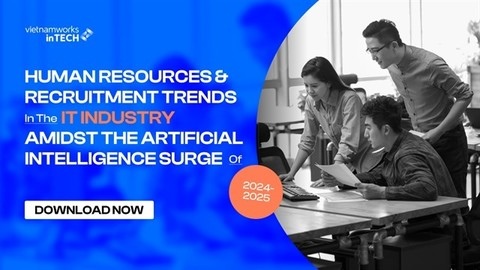Many businesses in Việt Nam willing to pay high salaries for AI personnel
Many businesses in Việt Nam willing to pay high salaries for AI personnel
A majority of companies are willing to offer higher salaries for AI candidates compared to other positions, according to a new survey conducted by Navigos Group.

The VietnamWorks inTECH - the IT recruitment brand under VietnamWorks - Navigos Group - officially launched the report on 'Human Resources & Recruitment Trends in the IT Industry Amidst the Artificial Intelligence Surge of 2024 - 2025'. — Photo courtesy of Navigos |
Specifically 43.7 per cent of companies reported that they paid AI personnel 10-20 per cent more, while 18.4 per cent indicated that the salaries of AI-related titles were 20-50 per cent higher than non AI-related titles.
The VietnamWorks inTECH - the IT recruitment brand under VietnamWorks - Navigos Group, officially launched the report on 'Human Resources & Recruitment Trends in the IT Industry Amidst the Artificial Intelligence Surge of 2024 - 2025' this week.
Based on a survey of 1,500 candidates and nearly 500 businesses in Việt Nam in July and August, the report offers a comprehensive overview of AI’s impact on the IT labour market.
From trend analysis to future forecasts, it provides IT professionals with insights to guide their career development and assists businesses in building effective recruitment strategies to tackle the challenges and seize the opportunities in the AI era.
According to the report, the IT job market in Việt Nam tends to be stable with a job turnover rate of only 32 per cent in the first half of this year.
However, the future outlook is more volatile, with the study reporting that more than 65 per cent of IT personnel are currently looking for a new job or planning to look for a new job within the next six to twelve months.
The three factors that IT personnel care about most when looking for a new job are a salary equal to or higher than the previous position, opportunities for career advancement and stability, especially in terms of the company's finances.
On the other hand, to quickly get a new job, many IT personnel said they were willing to consider taking on more work and undertake more multitasking.
This figure has risen by 10 per cent compared to a similar survey conducted last year. This, according to Navigos Group experts, shows that competition in the IT job market is increasingly fierce.
Social networks are still used by many IT candidates to find jobs. In particular, although Threads has only recently appeared, 4.4 per cent of IT personnel surveyed said they use this to look for jobs and 2.4 per cent of companies reported using it to reach out to candidates.
From the survey results for recruiters, the report shows that product managers and product owners are at the top of the difficult-to-recruit job positions, accounting for 25.6 per cent of the total number of responses.
Most companies believe that this position is difficult to fill because candidates do not meet the required qualifications.
Sharing his views on the influence and impact of the AI wave, director of Product and Engineering of Navigos Group, Phan Thanh Hiền said that the recent breakthroughs in AI, especially Generative AI, has made significant strides in recent years for businesses that want to apply AI to enhance work efficiency, as well as businesses that provide creative solutions based on the Generative AI platform.
For IT personnel, the Navigos Group expert believed that AI would significantly boost work efficiency in most roles, especially in positions such as developers, testers and product designers.
Those who know how to exploit AI's power would outperform those who continue to work traditionally, leading to a higher risk of elimination for those who fail to adapt, said Hiền.
At the same time, existing roles and positions of IT personnel will be performed in new ways thanks to AI. This requires a major shift in skills in most positions in the IT industry.
“In other words, while AI will accelerate automation, the human role in testing, evaluation, and optimisation will remain crucial,” said Hiền.
The Navigos Group expert also said that the ability to adapt and use AI was the biggest challenge that IT personnel as well as the IT recruitment industry faced when AI became the mainstream.
Generative AI opened up many opportunities, but also required both personnel and businesses to change traditional work methods.
Therefore, instead of viewing AI as an obstacle, personnel need to learn how to use AI to increase productivity, improve customer experience and create value faster and more effectively.
“To overcome this challenge, it is important for IT personnel and businesses to develop a flexible mindset and be open to learning new skills. Specifically, personnel must equip themselves with the skills to use modern AI tools, enabling them to optimise work by reducing manual tasks and focusing on more creative missions. From the business side, investing in training and building a culture of technology adoption is essential to allow employees to access and use AI most effectively,” Hiền said.



























